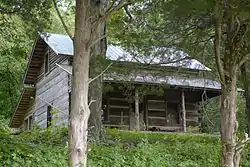Hair Conrad Cabin
The Hair Conrad Cabin is a historic log cabin in Bradley County, Tennessee, United States, and the oldest residential structure in the county.[2]
Hair Conrad Cabin | |
 | |
  | |
| Nearest city | Cleveland, Tennessee |
|---|---|
| Coordinates | 35°9′47″N 84°54′37″W |
| Area | 4 acres (1.6 ha) |
| Built | 1804 |
| NRHP reference No. | 76001765[1] |
| Added to NRHP | September 13, 1976 |
It is a single-pen cabin that was built in the early 1800s by a Cherokee known by the names Tekahskeh and Hair Conrad. Its construction followed the style of cabins built by white settlers of the era.[2][3]
Hair Conrad, who had a white father and a Cherokee mother, farmed the land near the cabin, growing apples, peaches, and other produce. A leader in the Cherokee community and a "man of means", he was the founder of a school for the education of Cherokee children. He participated in writing the Cherokee Constitution in 1827, and prior to 1836 he was a representative of the Cherokee Nation in Washington, D.C.[4] He was later (in 1838) to lead the first detachment of Cherokees from Rattlesnake Springs on the Trail of Tears and died soon after reaching Oklahoma in 1839.[2][4][5]
After Hair Conrad's departure, a succession of white families owned and lived in the cabin. It is now on the property of Blythewood Farms.[4]
The cabin was listed on the National Register of Historic Places in 1976.[1]
See also
References
- "National Register Information System". National Register of Historic Places. National Park Service. July 9, 2010.
- "National Register of Historic Places". Cleveland/Bradley Chamber of Commerce. Archived from the original on December 15, 2013. Retrieved January 26, 2014.
- "Your Passport to Explore Cherokee Heritage". VisitClevelandTN.com. Archived from the original on October 7, 2012. Retrieved January 26, 2014.
- "A closer look at the Hair Conrad cabin". Cleveland Daily Banner. August 24, 2011. Archived from the original on February 2, 2014.
- "A Brief History of the Trail of Tears". Cherokee Nation History and Culture. Cherokee Nation. Archived from the original on February 2, 2014. Retrieved January 26, 2014.